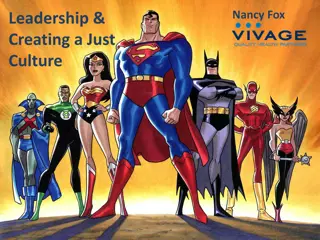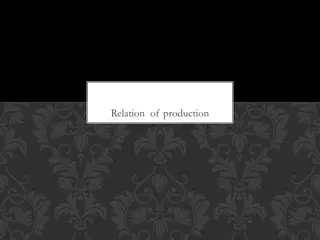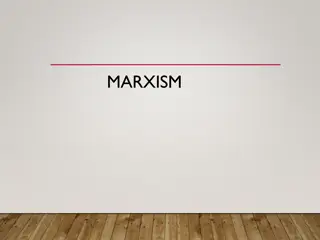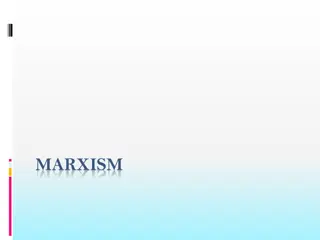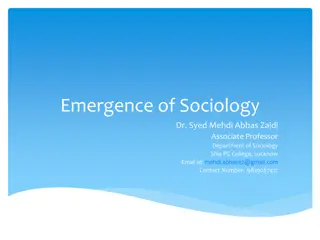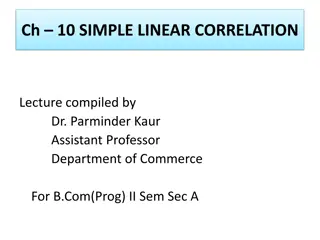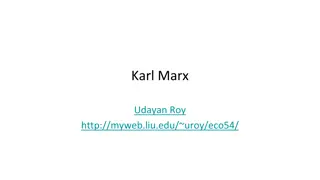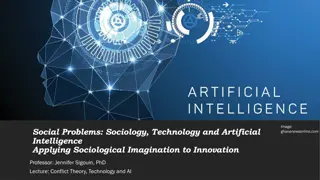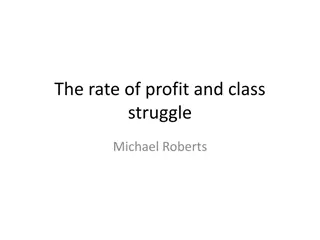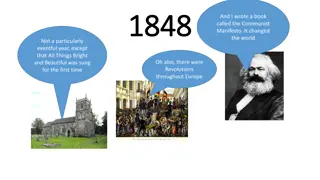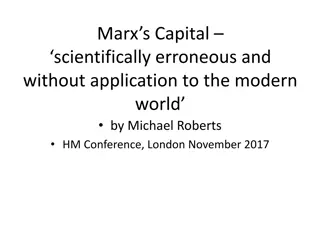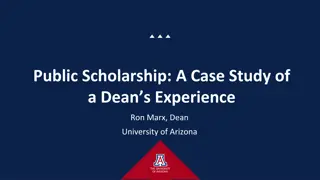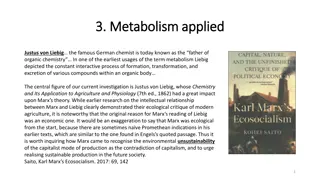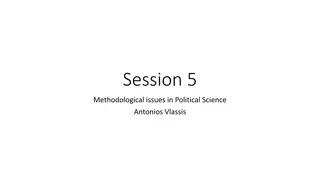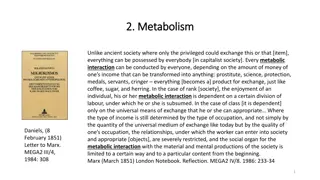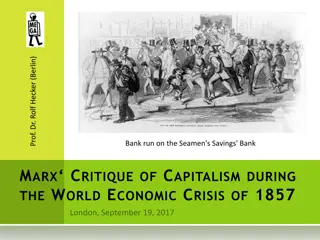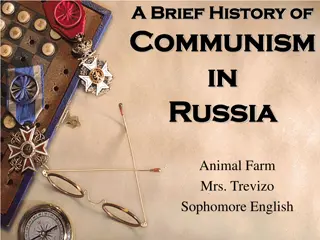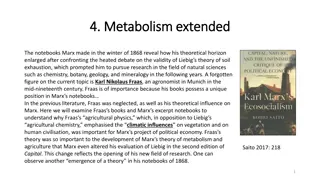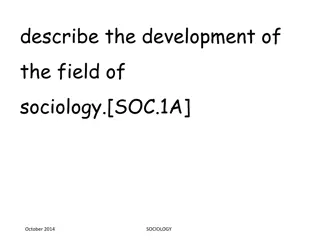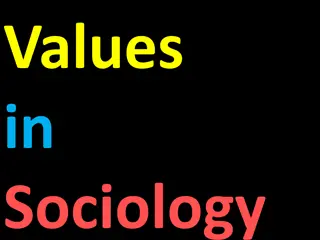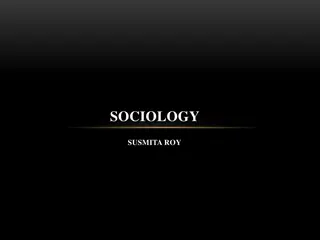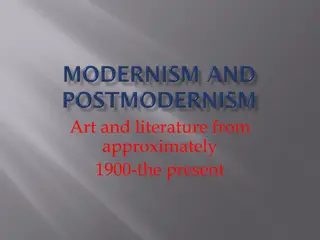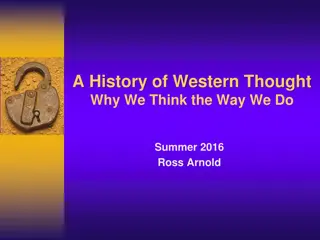Inside Salt Lake City Fire Department: Meet Captain Allen and Crew 11C
Salt Lake City Fire Department is a well-equipped department with 14 fire stations and a dedicated team led by Chief Karl Lieb. Fire Station 11, serving areas including the airport and Pacific Heritage Academy, houses Captain Allen and Crew 11C who are part of the department's educational partnershi
0 views • 25 slides
Uncovering the Violent History of Capitalistic Enclosures
Explore the historical context of capitalist enclosures, their violent impacts on peasants, and the moral justifications used to conceal these atrocities. Delve into how economic narratives created moral bubbles to justify violent acts, as examined through the lens of Marx's analysis. Unveil the par
1 views • 11 slides
Perspectives on Reality: Idealism vs. Materialism in Philosophy
Philosophy delves into fundamental questions about existence and reality. This lecture explores contrasting viewpoints of idealism, which posits that reality is mental, and materialism, which argues reality is physical. Examples from philosophers like George Berkeley and Karl Marx exemplify these pe
1 views • 12 slides
Approaches to the study of Human Rights
The Marxist perspective on human rights emphasizes social rights over individual rights, viewing the full realization of self within society. Marx connects bourgeois society with human rights, highlighting how exploitation under capitalism alienates individuals. In contrast, the Third World perspect
5 views • 19 slides
Understanding Just Culture in Leadership: Creating a Fair and Error-Preventive Environment
Punitive culture in institutions can lead to mistakes being hidden, affecting error prevention. Dr. Lucian Leape highlights the importance of avoiding punishment for errors, advocating for a Just Culture model. This model, coined by David Marx, recognizes human error and helps differentiate between
0 views • 24 slides
Binary Logistic Regression with SPSS – A Comprehensive Guide by Karl L. Wuensch
Explore the world of Binary Logistic Regression with SPSS through an instructional document provided by Karl L. Wuensch of East Carolina University. Understand when to use this regression model, its applications in research involving dichotomous variables, and the iterative maximum likelihood proced
0 views • 87 slides
Understanding Relations of Production in Society
People's need for survival drives them to engage in material production, forming the foundation of human existence. According to thinkers like Karl Marx, the interplay between economic production and social relationships shapes society's structure. The forces of production encompass technological ad
1 views • 7 slides
Understanding Marxism: Principles and Theories Explored
Marxism is a theoretical system developed from the writings of Karl Marx, emphasizing historical materialism, dialectical materialism, theory of surplus value, theory of alienation, and more. It posits that societal structures are determined by economic conditions and that progress evolves through d
0 views • 15 slides
Understanding Marxism and Capitalism
Marxism is a body of social, political, and economic thought derived from the works of Karl Marx and Friedrich Engels, focusing on the analysis of capitalism. Capitalism is an economic system where private individuals own goods and services based on market supply and demand. The purest form of capit
0 views • 25 slides
The Emergence of Sociology: A Historical Overview
Sociology, derived from Latin and Greek roots, has evolved over centuries through various stages, influenced by social, economic, and political factors. Key thinkers like Plato, Aristotle, Hobbes, Locke, Rousseau, Montesquieu, Comte, Durkheim, and Marx have shaped the discipline. The Industrial Revo
1 views • 23 slides
Understanding Simple Linear Correlation in Commerce: Lecture Compilation by Dr. Parminder Kaur
Correlation analysis is essential in understanding the co-variation between two or more variables. This lecture compiled by Dr. Parminder Kaur, an Assistant Professor in the Department of Commerce, delves into the definition of correlation, types of correlation such as positive/negative, simple/part
0 views • 12 slides
Retrieval Practice in Animal Farm: Lessons on Communism, Allegories, and Propaganda
In this detailed study guide, explore key themes from George Orwell's "Animal Farm", focusing on topics like the Communist Manifesto, bourgeoisie representation, capitalism vs. communism, rhetorical strategies, Karl Marx, fables, anthropomorphism, allegories, Russian Revolution parallels, and the us
1 views • 20 slides
Understanding Chi-Square Test in Statistics
Karl Pearson introduced the Chi-Square (X2) test for statistical analysis to determine experimental consistency with hypotheses. The test measures the agreement between actual and expected counts under the null hypothesis, making it a non-parametric test. It can be applied to various types of variab
6 views • 28 slides
Relevance and Limitations of Marx's Capital in Modern Social Theory
Exploring the ongoing relevance of Marx's Capital in contemporary social theory, Gary Herrigel from the Department of Political Science discusses its implications and theoretical considerations. Despite its foundational role, Marx's work also faces practical limitations, such as the challenge of tra
3 views • 14 slides
Karl Marx: The Revolutionary Thinker and Philosopher
Explore the life and theories of Karl Marx, a prominent figure in political philosophy and economics. Discover his works such as "Capital" and "The Communist Manifesto," as well as his theory of history and dialectical materialism. Learn about the impact of technology and power on the mode of produc
0 views • 42 slides
Understanding Critical Theory in International Relations: A Deep Dive
Critical theory in IR since the mid-1980s challenges traditional views by emphasizing culture, ideology, and societal structures over objective truths. This approach questions the relationship between theory and practice, highlighting issues of inequality beyond just class, including race, ethnicity
0 views • 9 slides
Understanding Conflict Theory in Sociology: Impact of Technology and AI on Society
Conflict theory highlights societal inequality and competition for resources, with power unevenly distributed. The works of Marx and Engels on capitalism, exploitation, and alienation are discussed, along with the deskilling debate and the shift to a post-industrial knowledge economy. The lecture ex
0 views • 30 slides
Innovations in Engineering Education: Reflections on Pedagogies of Engagement by Karl A. Smith
Reflections on pedagogical approaches such as Cooperative Learning and Challenge-Based Learning as discussed by Karl A. Smith in the context of transforming higher education towards student-centered learning experiences. Smith emphasizes the shift towards designing effective learning environments an
0 views • 37 slides
Understanding the Law of Profitability in Capitalist Accumulation
Explore the relationship between the rate of profit, class struggle, and capitalist accumulation. From the general law of accumulation to the law of profitability, examine how displacing labor affects the average rate of profit and learn about Marx's law of profitability. Discover the evidence from
0 views • 17 slides
Understanding Marx's View on History as a Changing Process
Marx views history as a continuous process evolving according to discoverable laws, rooted in human material needs. He emphasizes the role of the mode of production in shaping social development, with changes in history driven by changes in the mode of production, leading to shifts in social relatio
0 views • 16 slides
Exploring National Identity and Revolutionary Ideals in European History
In this discussion, we delve into Karl Marx's beliefs in the Communist Manifesto, the lack of Communist revolutions in the 19th century, the role of national identity in societies, and the concept of imagined communities as outlined by Benedict Anderson. Through analyzing historical events and schol
2 views • 10 slides
The Rise of Communism in Russia: Key Figures and Events
Russia's transition to communism was marked by social and political upheaval, with figures like Karl Marx, Lenin, Trotsky, and Stalin playing pivotal roles. The Russian Revolution, civil war, and the rise of the Soviet Union reflected a shift towards communist ideology, leading to significant change
0 views • 37 slides
The Rise and Rule of Leaders in Russia: Marx, Lenin, and Stalin
The journey of political upheaval in Russia, from the writing of the Communist Manifesto by Marx and Engels to the rule of Lenin and the dictatorship of Stalin, marked by revolution, famines, purges, and the Great Terror.
0 views • 13 slides
Marx Versus Keynes: A Critical Examination of Economic Theories
Michael Roberts critiques Marx's Capital as scientifically erroneous and irrelevant to the modern world, contrasting it with Keynesian economics which questions the applicability of communist doctrine in contemporary society. The debate revolves around value theory, production, economic crises, and
0 views • 41 slides
Public Scholarship: A Case Study of a Dean's Experience at the University of Arizona
Explore the case study of Dean Ron Marx at the University of Arizona, focusing on public scholarship and its impact on student achievement within the Tucson Unified School District. The study delves into the controversy surrounding Mexican American Studies and its effects on education, shedding ligh
0 views • 7 slides
Analyzing Hurricane Karl (2010): Doppler Radar Insights
Detailed analysis of Hurricane Karl (2010) using Doppler radar and WRF simulations, focusing on precipitation patterns over Mexican terrain and underlying processes. Includes NASA and NOAA grants, airborne radar measurements, WRF simulations, flight tracks, and velocity distributions comparison betw
0 views • 19 slides
Understanding Marxist Theory: Key Concepts and Implications
The Marxist theory, rooted in Karl Marx's philosophy, emphasizes the control of means of production as a determinant of societal power dynamics. This ideology examines economic power, materialism versus spirituality, class conflict, and the role of art, literature, and ideologies in shaping culture
0 views • 17 slides
Justus von Liebig: Father of Organic Chemistry and Environmental Visionary
Justus von Liebig, known as the father of organic chemistry, pioneered the concept of metabolism and its implications for agriculture, society, and the environment. His work influenced Karl Marx's ecological critique of modern agriculture and highlighted the necessity for sustainable production prac
0 views • 6 slides
Understanding Classical Marxism: Key Concepts and Critiques
Marxism, rooted in the ideas of Karl Marx, emphasizes the significance of economic relations in shaping social and political structures. Classical Marxism focuses on economism, determinism, materialism, and structuralism, viewing history through a lens of class struggle and offering an emancipatory
0 views • 21 slides
Understanding Metabolic Interaction in Society
In a capitalist society, metabolic interactions and exchanges are influenced by one's income and occupation quality. This separation between human existence and nature is emphasized in the relation between wage labor and capital. Marx's writings highlight how labor is essential for the metabolic int
0 views • 6 slides
The Algonquin Round Table: A Creative Gathering of the 1920s
The Algonquin Round Table was a diverse group of artists, writers, and critics who met at the Algonquin Hotel in the 1920s, known for their wit and irreverence. Members included notable figures like Dorothy Parker, Robert Benchley, and Harpo Marx, who influenced modern journalism and brought a fresh
0 views • 6 slides
Marx's Critique of Capitalism During the 1857 World Economic Crisis
In 1857, amidst a world economic crisis, Karl Marx worked tirelessly on his economic manuscript, the Grundrisse, focusing on the political economy outlines and the current crisis. He aimed to create a pamphlet to remind the German public of his presence. Marx identified France as a potential site fo
0 views • 13 slides
A Brief History of Communism: From Capitalism to Karl Marx's Vision
The history of communism traces back to the capitalist system's exploitation of workers in the mid-1800s. Karl Marx's vision, outlined in "The Manifesto of the Communist Party," aimed for economic equality and worldwide revolution. The inherent flaws of capitalism were critiqued, leading to the rise
0 views • 17 slides
Marx's Exploration of Agriculture and Metabolism Through the Lens of Fraas's Theory
Marx's notebooks from 1868 reveal his expanded theoretical perspective influenced by Karl Nikolaus Fraas, an agronomist in the mid-19th century. Fraas's agricultural physics, focusing on climatic influences on vegetation and civilization, played a crucial role in Marx's development of the theory of
0 views • 6 slides
Dr. Karl Marx A. Quiazon - Expert in Aquatic Biosciences and Fisheries Management
Dr. Karl Marx A. Quiazon is a highly accomplished academic and researcher in the field of aquatic biosciences and fisheries management. With a Ph.D. from the University of Tokyo, Japan, he has extensive experience in fish diseases and aquaculture. He has held various academic positions in the Philip
0 views • 15 slides
Evolution of Sociology: Key Figures and Societal Analysis
Explore the evolution of sociology through the contributions of leading sociologists like Auguste Comte, Emile Durkheim, and Karl Marx. Understand the impact of different types of societies, cultural elements, and societal changes. Dive into the intricate web of cultural life in the United States an
0 views • 63 slides
Exploring Values in Sociology: A Critical Analysis of Objectivity and Subjectivity
Delve into the complex interplay between objectivity and subjectivity in sociology, examining whether true value-free research is achievable. Classical sociologists like Comte, Durkheim, and Marx are scrutinized for their perspectives on the role of values in sociological inquiry, challenging the no
0 views • 17 slides
Understanding Social Class in Sociology
Social class, also known as class, refers to a group of individuals in a society who share similar socioeconomic status. The concept of class plays a crucial role in social theory, influencing social mobility and census data. From early theories by political philosophers like Hobbes to Marx's influe
0 views • 17 slides
Exploring Art and Literature from 1900 to the Present
Novels, plays, and poetry saw a resurgence post-Whitman and Dickinson, with writers experimenting with unique styles like interior monologue and stream of consciousness. Characters chased the American dream, expressing admiration for America as a land of opportunity. The Modernism movement reflected
0 views • 13 slides
Evolution of Western Philosophical Thought: From Idealism to Humanism
Explore the rich history of Western philosophical thought from the idealism of Plato to the humanism of Whitehead. Trace the progression of thought, including materialism, rationalism, skepticism, and relativism, as key thinkers like Descartes, Kant, Marx, and others shaped our understanding of real
0 views • 16 slides




